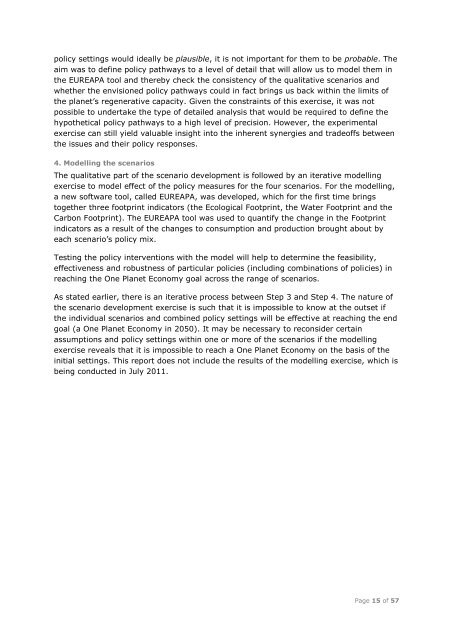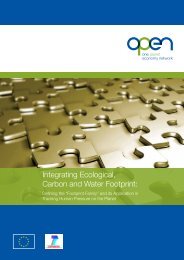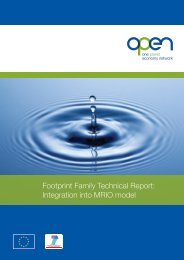OPEN: EU Scenario Storylines Report: - One Planet Economy Network
OPEN: EU Scenario Storylines Report: - One Planet Economy Network
OPEN: EU Scenario Storylines Report: - One Planet Economy Network
You also want an ePaper? Increase the reach of your titles
YUMPU automatically turns print PDFs into web optimized ePapers that Google loves.
policy settings would ideally be plausible, it is not important for them to be probable. The<br />
aim was to define policy pathways to a level of detail that will allow us to model them in<br />
the <strong>EU</strong>REAPA tool and thereby check the consistency of the qualitative scenarios and<br />
whether the envisioned policy pathways could in fact brings us back within the limits of<br />
the planet‘s regenerative capacity. Given the constraints of this exercise, it was not<br />
possible to undertake the type of detailed analysis that would be required to define the<br />
hypothetical policy pathways to a high level of precision. However, the experimental<br />
exercise can still yield valuable insight into the inherent synergies and tradeoffs between<br />
the issues and their policy responses.<br />
4. Modelling the scenarios<br />
The qualitative part of the scenario development is followed by an iterative modelling<br />
exercise to model effect of the policy measures for the four scenarios. For the modelling,<br />
a new software tool, called <strong>EU</strong>REAPA, was developed, which for the first time brings<br />
together three footprint indicators (the Ecological Footprint, the Water Footprint and the<br />
Carbon Footprint). The <strong>EU</strong>REAPA tool was used to quantify the change in the Footprint<br />
indicators as a result of the changes to consumption and production brought about by<br />
each scenario‘s policy mix.<br />
Testing the policy interventions with the model will help to determine the feasibility,<br />
effectiveness and robustness of particular policies (including combinations of policies) in<br />
reaching the <strong>One</strong> <strong>Planet</strong> <strong>Economy</strong> goal across the range of scenarios.<br />
As stated earlier, there is an iterative process between Step 3 and Step 4. The nature of<br />
the scenario development exercise is such that it is impossible to know at the outset if<br />
the individual scenarios and combined policy settings will be effective at reaching the end<br />
goal (a <strong>One</strong> <strong>Planet</strong> <strong>Economy</strong> in 2050). It may be necessary to reconsider certain<br />
assumptions and policy settings within one or more of the scenarios if the modelling<br />
exercise reveals that it is impossible to reach a <strong>One</strong> <strong>Planet</strong> <strong>Economy</strong> on the basis of the<br />
initial settings. This report does not include the results of the modelling exercise, which is<br />
being conducted in July 2011.<br />
Page 15 of 57





